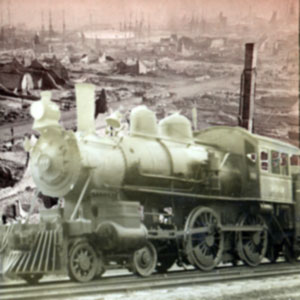Ellen Gibbons: Going vs Staying
An eternal question: When do you stick it out? When do you hit the road?
(3 min)
 This audio story is about my great-grandmother Ellen Gibbons, who wanted the good life and didn't mind picking up and moving to get it. She arrived in Chicago from Ireland on the eve of the Great Fire of 1871. Did she stick around to help with reconstruction? Hell no...
This audio story is about my great-grandmother Ellen Gibbons, who wanted the good life and didn't mind picking up and moving to get it. She arrived in Chicago from Ireland on the eve of the Great Fire of 1871. Did she stick around to help with reconstruction? Hell no...
This story is true,* based on oral history, conveyed through the generations and verified with immigration and census data. The only mystery is what exactly she was doing in St Louis for the 10 years before she got married and moved out to the farm. We can assume she worked as a domestic for one of the wealthy St Louis families -- a common occupation for young Irish women, who often came to America on their own and networked with sisters and aunts to become self-supporting.
The background on this photo-montage is the aftermath of the 1871 fire in Chicago. The train is for getting outta town on.
Script
When do you stick around? When do you pick up and go? When do you stay to fight the good fight? And when do you hit the road? I'm thinking about my great-grandmother Ellen Gibbons, who arrived in Chicago just in time to see it burn down.
In Ireland of the 1870s, the famine was over. But for young women like Ellen, there were no jobs and no men worth marrying, so at the age of twenty, she got up and went. Sailed to New York. Caught the train to Chicago. Arrived on September 27, 1871. On October 8, O'Leary's barn caught fire. Chicago burned for three days. 100,000 people were homeless.
Did Ellen stick around to help clean up and rebuild? Not on your life. Like a bat out of New Orleans, she headed for the next stop on the Immigrant trail -- St Louis.
Look at history. Those who stick it out through wars, famines, epidemics and disasters are admired for their courage and perseverance. They are the Healers, First Responders, the Freedom Fighters, the Citizens. They are the roots of society.
But those who take to the road have their own magic. They are the exiles and explorers. The restless migrants, the cowboys and the prospectors, who see the future just over the next hill. They don't preserve society. They invent it as they go along.
It took Ellen 10 years to find a good husband. She joined Frank Barrett and his family of homesteaders out on the rolling farmland of Missouri. But within 15 years she'd had enough of that too -- enough of sharing a log cabin with her in-laws, enough of miscarriages, enough of riding horses side-saddle to church every Sunday. She did not want her tombstone planted on the prairie. That was not her idea of America. That was not her idea of Ellen Gibbons. So she badgered her husband till he took her and their children back to St Louis.
When the going gets tough, some of the tough can tough it out. And the rest of ‘em – like Ellen Gibbons – get outta town.
8.19.2008

